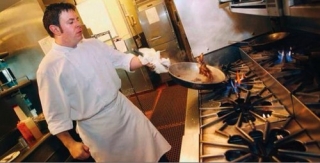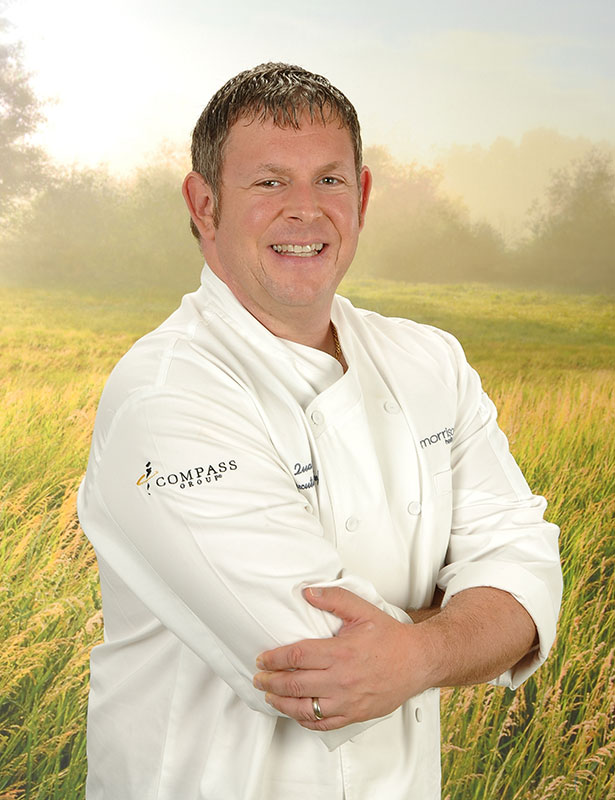
Breaking the Credibility Stigma of Non-restaurant Chefs
07 January 2020Cooking careers that include innovation, sustainability and celebrity chef special events are possible without restaurant experience.
By Lisa Parrish, GMC Editor
 Cooks are in great demand today in sectors such as fast casual, healthcare, fine dining, corporate dining, and senior living just to name a few. Culinary and hospitality career paths are more wide-open than ever before as more Americans are eating Food Away From Home (FAFH). According to research conducted by the US Department of Agriculture, 10 years ago in 2010 Americans for the first time spent more money on FAFH than for food at home. Over the last 10 years, that number has greatly increased as millennials, who have a greater preference for prepared foods and more disposable income than older age groups, continue to drive where food is consumed.
Cooks are in great demand today in sectors such as fast casual, healthcare, fine dining, corporate dining, and senior living just to name a few. Culinary and hospitality career paths are more wide-open than ever before as more Americans are eating Food Away From Home (FAFH). According to research conducted by the US Department of Agriculture, 10 years ago in 2010 Americans for the first time spent more money on FAFH than for food at home. Over the last 10 years, that number has greatly increased as millennials, who have a greater preference for prepared foods and more disposable income than older age groups, continue to drive where food is consumed.
With such a variety of foodservice career paths available, why is there the persistent view that chefs who cut their culinary teeth in the restaurant sector have more cachet or admiration than those who have come up through different foodservice ranks?
Selling out
Perhaps it’s an unwritten rule, but within some culinary circles it is perceived as selling out to take a corporate position and leave the restaurant sector. That’s how R & D Executive Chef for Morrison Healthcare Jeffrey Quasha felt before landing in a non-restaurant position.
“My mindset was never to work in a corporation. I thought it was selling out,” he said.
Prior to his current position, he spent more than 10 years in quick service, full service, fine dining, and large-scale catering businesses holding positions from dishwasher to senior executive chef. He worked in kitchens from hamburger joints to three stars and three diamonds establishments. He always loved food and working in a kitchen. However, his career priorities shifted after the death of a family member. “When my mother in law died from cancer I began to change my mindset. (I realized) You can’t take it with you,” he said.
“I only had time to work,” Quasha explained. “I didn’t have time to spend money. I was working 80 to 100 hours a week. I didn’t have holidays. I didn’t have a 401K retirement plan. I didn’t have time to spend with my family. I didn’t have a quality of life. I started thinking about changing my goals. I had to invest in myself.”
Quality positions with quality of life 
“Being in healthcare has been one of the most rewarding career moves I could have ever made. I just wish I did it sooner. I didn't realize that I could be just as - or even more innovative - than when I was running restaurants. I could work with celebrity chefs on concepts and events and help develop new products with major manufacturers. All this and still have a quality of life,” he said.
Since his promotion in 2015 to corporate executive chef for Morrison Healthcare, Quasha has developed over 45 pop food hall style concepts, six fast casual restaurants and has emerged as a leader in the Healthcare retail industry.
Large-scale foodservice corporate establishments who are in desperate need of employees can be found in hospitals, senior communities or even corporations.
Another example of a large, innovative corporate foodservice establishment is the healthcare software company, Epic, located in Verona, Wisc., on a 950-acre campus. Each day the award-winning dining services division prepares 8,000-9,000 made-from-scratch meals from globally-inspired entrees to feel good-comfort food. The company supports three dining halls featuring salad bars, a build-your-own-sandwich bar with hearth-baked breads, stations that serve comfort food, grill area, and entrée station. Desserts are fresh-baked pies and layer cakes from Epic’s own in-house bakery. Their menus change daily and rarely is a dish repeated throughout the year. The chefs there enjoy stability, are employees of Epic with full benefits, and are challenged to create award-winning food every day.
Non-restaurant foodservice positions and corporate training
Quasha’s employer Morrison Healthcare’s parent company Compass Food Group is the world’s largest foodservice contractor. The company supports foodservice operations in educational campus settings, healthcare settings, senior living communities, sporting and entertainment venues, museums and performing arts centers, and more. Currently, they have more than 8,000 job openings nationwide listed on www.compassgroupcareers.com.
Compass also supports two training programs, Managers in Training (MIT) and Traveling Sous Chefs, which are available to the company’s new hires or existing personnel in the foodservice arena. The MIT platform is designed to teach relevant operational experiences and manager leadership skills to its future leaders. Quasha described the Traveling Sous Chef program as designed to engage people in the culinary industry who have more experience and are looking to make a career change.
In addition to Morris Healthcare and Compass Food Groups programs, non-restaurant culinary and hospitality positions are posted on many websites, including ACFchef.com, Hcareers.com, Indeed.com and LinkedIn. New culinary graduates looking for corporate positions can also attend large food shows or any of the regional ACF conferences. “Recruiters from every facet of our industry are posting articles and jobs on a daily basis on LinkedIn,” Quasha noted.
Role models outside the restaurant sector
Quasha contends that culinary students should be more aware of career paths outside the restaurant sector. He suggested educators add guest chefs to their classrooms and kitchens. Corporate chefs that could serve as role models and mentors to the students. He also said,” I feel the amount of non-restaurant chefs participating in articles in food magazines, James Beard Dinners, Food Network shows and attending local food and wine festivals will help break down the stigma of being a non-restaurant chef.”
